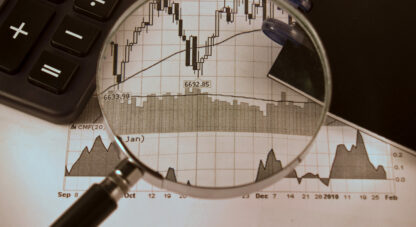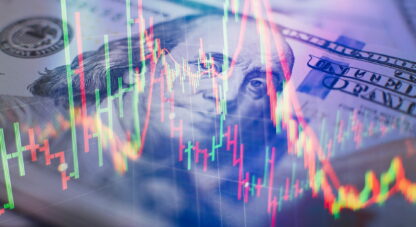The McAlvany Weekly Commentary
with David McAlvany and Kevin Orrick
Kevin: David, it’s the strangest thing. The last week or two it’s like the entire world is catching flame. It’s turning on fire. We have situations here in America and St. Louis. We have Ukraine, we have the Gaza situation, which, even though there are treaties and truces, it doesn’t look like it is going to last. Then, of course, we could go on, but Russia and the exercises that they are running over around Asia right now is causing Japan consternation. So why are people not reacting? I’m watching gold. Yes, it will go up $5-6 and then somebody will knock it back down. Why are we not seeing a reaction anywhere in the markets?
David: I think there are a lot of risks that are underappreciated – very much underappreciated, and there is this sense, as we mentioned maybe a month ago, that the central banks of the world have everything at their fingertips and under control. They certainly have conveyed that verbally, and the market believes it. It’s more than just a proposition. It’s something that people have faith in, that yes, the central banks, whether it is Janet Yellen and Stanley Fisher, or Mario Draghi, or Kuroda over at the Bank of Japan, Mark Carney at the Bank of England, these folks have figured it out. They have actually discovered something of a fountain of youth. If we had only known this 100 years ago, 200 years ago, 300 years ago, we never would have been subject to the vagaries of the market, nor would politics or geopolitics have come into the markets in any way, to disrupt, or bring challenges to perpetual growth. That, believe it or not, is the underlying thought structure, and I think it is a misplaced belief, but it is a belief, nonetheless, and it obscures or allows risk to go underappreciated.
Kevin: It is no secret we live in a beautiful area down here in Southwest Colorado, but it is an area fraught with danger if you are not prepared for the risks. Oftentimes, we will have flatlanders come into the mountains, unprepared. I know you and your kids just finished climbing a 14,000 foot peak. To do that – you look at those peaks, and it’s not just a hill climb. That is something you have to actually time correctly, dress for correctly, and know when to turn around if it is not right. You guys have to appreciate risk when you go and do that with your young boys.
David: Sure. We started spending time in the mountains when I was a teenager, maybe 12-13 years old, and so it is a way of life, you could say, an avocation, and it is what we do as a family in our free time. Our family climbed to the top of a mountain a week ago. For my sons, this was their first 14’er. There are over 50 of them in the state of Colorado. While we were up there, I was surprised by a number of things. At first, knowing the area, and knowing the time of year we are in, the afternoon usually brings rain and thunderstorms. And of course, thunderstorms and lightning are not a good idea for a family activity for above treelines. We could say that’s an axiom. Yeah, don’t be above treelines in a thunderstorm.
So, in order to address that particular issue, if you want to mitigate that risk, you start your climbing early in the morning, and get off the mountain before the clouds roll in. It’s pretty easy to accommodate. You don’t have to say, “Well, I’m just not going to the mountains then.” You just have to know when to start. It means you get up early and eat an early breakfast, or a small breakfast, and get on the road. There are three things that I observed while we watched, literally, piles of people climb this particular mountain. One, there were many of them who were climbing with no water. They had no packs; they had no provisions of any kind. No water bottles – nothing.
Kevin: So the assumption that everything was going to go perfectly well, because at that altitude, not only do you need to have that kind of water, but you are going to dehydrate at a much higher speed.
David: Or perhaps with the misunderstanding that drinking from a mountain stream is somehow a good idea, because if you’ve done that before, and I remember watching a young man get gravely ill on a mountain trail. I was probably ten years old. With my father, we went out with a good friend of his, and his son, and he drank from the mountain stream, and the next day he was in hospital. It turned out there had been a horse that had died much father up into the mountains and had polluted the water stream. He ended up with a very, very severe internal infection and was hospitalized for over a week.
There were a couple of other things that I saw. Not only did they not have water, there were many of them who were climbing in cotton. This is just normal street clothes, jeans and t-shirt. They had no wind protection, no weather protection – that’s the second thing that I saw. The last thing that was interesting to me was that many of them were just starting the climb at around 12 noon. That’s when we were coming off the mountain. You need to finish, if you want to avoid the lightning storms, those usually come up between 1:00 and 3:00 in the afternoon. So, if you are off the mountain before that timeframe – no harm, no foul. But to start climbing into the high elevations right when the peaks should be covered in clouds – this is a dangerous thing.
Kevin: To be honest, Dave, I’ve done a little bit of 14’er climbing myself – not as much as you – and had I not have known the history, and heard from other people, the things that you just now said, in other words, make sure you take plenty of water, make sure you have plenty of rain gear and weather gear, because ever thousand feet that you climb, the temperature is going to drop at least 4 degrees. If you don’t know those things ahead of time, I can understand why people who have never heard about mountain climbing before would show up and not really understand the risk. How did the boys do?
David: The boys did great. As you mentioned, weather changes, even just those sort of climate changes, if you will, 30 degrees. At the bottom of the mountain, it was a good 85, maybe 90 degrees, and by the time we got to the top, with a little bit of cloud cover, 55-60 degrees.
Kevin: In the middle of July.
David: In the middle of July. But the boys did great. Granted, it was challenging, but I watched them dig deep and push past a variety of fears. We carried what we needed for a variety of changes, whether it was wind, rain, or anything else, and we finished before any weather came and was threatening, if you will.
Kevin: It is very obvious, the analogy that we are starting to move into. The stock market continues to climb, and climb, and climb. It is not paying attention to geopolitical events. In fact, when I have read reviews, they are saying, “Well, the stock market might be a little muted in its climb, based on what is going on.” But is it realistic?
David: There are a lot folks with retirement funds, 401ks, and they will look at a target fund, which is to say, “I’m going to retire in 2035, or 2025, or 2015.” And you put your money into that particular mutual fund, it is a diversified fund which targets that date, and it is supposed to take account of the risks that are going to be encountered, to get you to a place where you have experienced growth and are able to retire at that point, assuming that you have put in a sufficient amount of cash, initially.
We were looking at a target term fund, J.P. Morgan’s 2015 fund. This assumes that a person is going to retire next year. Going back to this notion that there are huge, underappreciated risks, the allocation, as we looked at it, was 42% equities.
Kevin: Almost half in the stock market.
David: Yes, and the remainder was in a variety of emerging market debt and stocks, as well, from emerging markets, and some junk bonds. There was a sliver of commodities in there. And by the way, that allocation, 42% allocated to equities, that’s with a one-year time horizon to retirement, and that is a far lower allocation to equities than most in these target funds. So, quite frankly, it’s the kind of déjà vu I had when climbing the mountain the other day, watching as the casually dressed climber was going up a rather exposed mountain, no pack, no water, no jacket, thinking that it’s going to be this beautiful experience, getting to the top, looking at the vistas. And of course, this is what we want in retirement, right? We’ve put in the pain, now where’s the gain? The sweat equity has been earned, we saved, and now it’s the golden years, and frankly, it is risk at precisely the wrong time, and it is under appreciated.
Kevin: I flew for years with Civil Air Patrol. We had to, unfortunately, look for people who proceeded with too much confidence, and with ignorance. You can do that with mountain climbing. There are number of things you can do that with. What you are talking about right now is retirement. If you just look back at history, you understand that when you are one year away from retirement, with a stock market that is hitting new highs, you probably don’t want to have more than half of the allocation in stocks.
David: As you mention, maybe it is just ignorance of circumstances, and not being familiar with an environment. If you are a flatlander coming to the mountains, not knowing that you can have snow in the middle of July, things like that come as a grave surprise, confidence is the other part of that. As you mentioned, Civil Air Patrol, if you look at the statistics, the number of downed airplanes that are flown by doctors would astound you. And a part of it is that confidence, or rather, overconfidence, that somehow their expertise, or all knowing, transfers into all areas of life, and somehow their judgment – and again, I don’t know exactly where this comes from, but a little too much overconfidence in that environment gets a lot of doctors killed.
Kevin: Dave, this isn’t to offend anybody, but actually, you can find that with any profession, where a person has to make authoritative, quick, connections and judgment calls, if they apply that to another area, it can be dangerous. Pilots, yes, we used to call the Bonanza, which is a type of plane, the doctor killer, just because that is what doctors could afford, and then they would fly from the flatlands into the mountains, and unfortunately, it was, literally, into the mountains. In investments you can do that professionally, in your investment portfolio, thinking that you understand what is going on by seeing what your neighbor is doing. A doctor watching another doctor invest is probably one of the most dangerous things for a portfolio.
David: Well, sure. In addition, looking at a limited time slice of success, anyone who climbed that mountain with us that day – listen, we didn’t have weather, we had a great day, the experience was bright sunshine almost the entire time. Things that would have been theoretical risks – maybe I’m on the edge of paranoid in terms of taking those things and assuming that they are going to happen so that I am prepared for them if they do happen. If you took anyone on the mountain that day, what you would find is that these are people who now had experience from the day, and that experience would give them the false idea that you can climb without water, that you can climb in a pair of blue jeans and a t-shirt, that you don’t need a jacket, that it’s happy-go-lucky every day, and in all circumstances. I think that, again, is where, if you are construing the future upon the past, there are some issues in play. Mountains and market share this in common: At times they are unforgiving, and at times you find risk being overlooked for the allure of beauty, the vistas which stir you deeply, the idea that tomorrow is going to be everything that you hoped it would be, and that you somehow have control over that.
Kevin: Just in case someone is mistaking you for somebody who is paranoid about risk, Dave, you go out and take risks that, frankly, I don’t feel comfortable with. You have felt comfortable climbing flat-faced mountains, and I’m not talking about the 14’ers, but actually just pure technical types of climbs. Those types of things I’m not interested in, but you still calculate the risk, don’t you? You’re not a reckless risk-taker.
David: Right. I don’t shy from risk, but I do calculate as much as possible, and look for contingency plans in case I meet Mr. Murphy along the way, and there are many more mountains that I have turned away from and not gone to the peak because there were circumstances that just said to me there are too many risks here, and I’ve got too many responsibilities to care about getting to the top. Many investors today look as out of place being in the stock market, and maybe I can be a little hyperbolic here, as a woman in a cocktail dress, fashionably sporting 3-inch heels on that mountainside. You just have to say, “No, it doesn’t really fit. Not here, not now. It was kind of humorous, but later in that day we actually did run into a group that was dressed to the nines. It was a wedding party, redefining the wedding destination theme at 13,000 feet. What set them apart from the hikers, of course, was that they had access to jeeps so they could beat a quick retreat if they needed to.
Kevin: So, if weather set in they could beat a retreat, or if the groom or bride changed their mind…
David: (laughs)
Kevin: They could beat a retreat. Dave, in the past, over the last 6-7 years doing this show, you have taken great pains to make sure that we understand the situation over in the Middle East. So, periodically, we’ll have experts on that can explain the situation, because the Islamic world is very complicated. It has gone from rather simple to complicated because you have Sunni and Shi’a and Wahhabi, and then you had the Ottoman Empire that came in, and then you had the destruction of the Ottoman Empire, and the spreading of the various countries and the lines being drawn. Turkey, though, seems to play more of a key role than people give it credit for. We’ve just had an election in Turkey and I think it is important for us to talk turkey a little bit.
David: Erdogan moved politically sideways into the presidential suite, stepping down as the leader of the AKP, that is, the Justice and Development Party, in what appears similar to Putin’s move a few years ago from one political post where he was exhausting his term limits, right into another.
Kevin: So, you don’t have to call me President anymore, you can call me Chancellor, or King.
David: So, what is the story with Erdogan? He is likely to, in the role of president, redefine the role of president, expand the powers for the office, consolidate control of the Turkish political machine, and he has effectively, the last ten years, created what he calls the pious generation. The pious generation sounds a lot more palatable than something that is sort of radical in terms of an expression of Islamic belief. But at this point in the country, there is only about 1% of the Turkish population which is not Muslim. This is the exact opposite of what Mustafa Kemal Ataturk created in the founding of the Turkish state in 1923. He was the general who fought the allies, won in 1922, and set up the state in 1923. What we have seen, really, in the history of Turkey, is the pendulum swinging from an Islamic theocracy, to a secular state, and back again. And sometimes, I would agree, listeners may wonder why Turkey and other far-flung destinations are important to us. It goes back to the impact of what happened during the Iraq war.
Kevin: It is interesting, when we’ve interviewed Friedman from STRATFOR and some of the other guests that we have had, who have said, “Once you create a vacuum in Iraq, it was almost like Iraq was the center of an Islamic wheel, and when you take out the power, Saddam Hussein, whether good guy or bad guy, and we know he was probably more bad than good, take that stronghold out and you create a vacuum. I remember when Friedman was on and he said, “This vacuum is either going to be filled by the Shi’a side, which is Iran, or Turkey and Syria are going to step in, and it is going to be filled on the Sunni side. It seems like that is happening right now.
David: Yes, and it’s not just the drawn out military commitment that cost us nearly 2 trillion dollars, but it was the destabilization of the entire region resulting from that strongman being yanked out of power, and the disturbance that meant to the regional power structures. Since that time, the Middle East has been trying to define not only its orientation, but also to determine who will set the tone for the Muslim world. The contenders are Egypt, Turkey, Iran, and Saudi Arabia. These are the contenders for Islamic leadership in the 21st century, entre the non-state actors like ISIS or ISIL, and they have a growing importance with the key distinctive they share with a number of those other countries. They are Sunni, as well.
Kevin: David, it is interesting that you brought in non-state powers, because ISIS and ISIL are not states. They’re calling themselves states, but they don’t really care. They’re states without lines. They’re just moving across anywhere they want to move across, and you can call it barbaric, but it has definitely been effective. You have people who were the enemy who are defecting over to ISIS, because not only are they seeing success, but they are scared of being shot or buried alive.
David: It’s interesting. Martin van Creveld, when I met with him at Hebrew University in Jerusalem, makes a point over and over again in a lot of his research, that the state is a very modern creation, and the Muslim faith predates the existence of the state by almost 1100 years. You’re dealing with something that has been a recurrent theme in the Middle East, and certainly in the conflict between the Shi’a and the Sunni going back 1300-1400 years. But it is very interesting to see, of greater and greater importance, as we see, as van Creveld said, the changing face of warfare. It is not between state actors, it is between small regional bodies with different interests, and they don’t necessarily align along political lines, and in this case we are talking about something that is driven by religion, the Sunni/Shi’a conflict literally going back centuries.
Kevin: I think what makes things confusing on our side, the Western world side, we are watching Muslims slaughtering Muslims, and this is not something new, this has been for hundreds of years, well over 1,000 years. I think it is important to understand the definition. What is a Sunni Muslim? What is a Shi’a Muslim.
David: A scholar could do a much better job of this, but in a nutshell, it is a struggle for who represents the authoritative voice of Mohammed, who sustains the legacy and controls the interpretation of the Koran, their holy book. You have Iran, you have Iraq, you have Bahrain, and you have Lebanon. These are the Shi’a countries. Virtually the remainder of the Islamic world is Sunni, and the difference is a leadership dispute going back to shortly after Mohammed died. The Shi’a opted to follow Mohammed’s cousin and son-in-law, and the Sunni preferred Mohammed’s father-in-law and a good friend of his. The Sunni, if you want to think of them as sort of the sola scriptura types, they focus more on the strict interpretation of the Koran, and less on traditions practiced in mosques. Very popular amongst Shi’a is the idea that there were 12 Imams and the 12th Imam disappeared and they are awaiting the return of the 12th Imam. Some of this becomes sort of extra-scriptural, if you will, and the Sunni are particularly critical of that. So, the Shi’a are being slaughtered indiscriminately in Iraq today alongside Christians, as if they are no better than Christians, heathens, which is somewhat ironic, because if you look at the history of Islam, there were long stretches of time when they had no conflict with anyone who was non-Muslim. I say that because they had hopes that you would convert. They might charge you a tax for existing in their land, but they would not necessarily kill you just because you had a different belief. There was still the hope that you would convert to the Islamic faith.
Kevin: It’s about time, frankly, that the curtain be pulled back on Saudi Arabia. When we go back to 9/11 we can go back to a number of terrorist actions that were funded by a country that we have tried to protect the identity of based on oil and OPEC and money flow and the Saudi royal family. It’s not the Saudi royal family that is funding this terrorism, but within Saudi Arabia this has been probably the main area where this radical Sunni Islam is being funded.
David: It is interesting, in conversations that I have had with people of Islamic faith, they have at time expressed untempered criticism of the Wahhabi expression of Islam. Their words would not be “wingnuts,” but it’s awfully close to that. What is interesting is that the Wahhabis were empowered and given extra influence in the world of Islam because of the oil revenues. It is certainly not the Saudi royal family that is as much a concern, but you have families in Saudi Arabia which have done most of the funding of the terror that the Western world has seen in the last 50-100 years.
Kevin: And what makes this so critical to understand is that Saddam Hussein was a Sunni island in a sea of Shi’ites, wasn’t he? So, when you take that power, he really did exert a horrible kind of power. That is how he kept the throne, but nonetheless, you pull that out and what do you do but create a vacuum and chaos.
David: That’s right. A minute ago I said that Iraq was one of the Shi’a countries, along with Bahrain, Lebanon and Iran, but you are right, it was a Sunni leader who was leading the Shi’a, and he did, he managed that place with an iron fist. He was cruel, he was brutal, and he kept a lid on the conflict, so to say, and without that sort of nasty leadership, what you have is a power struggle now. Who is in charge of the Sunni seat, and are the Shi’a really necessary. It is almost as if the Sunni have a vision of Shi’a extinction. So, bringing the Sunni ideas back into the region in hopes of establishing Sunni leadership once more, then you’ve got Iran, whom we have no real love for, but they, regionally, are the real counterweight to the Sunni-dominant Islamic world. Again, you may say, why now? Well, the reality is that it is not only now, but it has been for a long time, 1370 years’ worth of conflict between these two groups, the Sunni and the Shi’a. You could argue that certainly within Christianity, the Eastern church and the Western church had their own conflicts, and at times it was violent. I think for several hundred years now we have had that behind us, but I don’t think that any period of time really has existed in 1370 years where the Shi’a and Sunni have been at peace. The question is, should we be involved in sectarian infighting at all?
Kevin: We’re having to pick sides at this point. We’re bombing the Sunni extremists right now. We’re now having to go over to Iran and say, “Gosh, yes, we’re enemies in one respect, but can we be allies in this other respect?” It is very confusing.
David: (laughs) The enemy of your enemy is your friend. Well, 170,000 are dead in Syria so far in what is really sectarian infighting. We would like to put a prettier picture on that and say it is about freedom and it is about changing, just like with the rest of the Arab Spring, from a corrupt government to something that represents the people’s choice and a better form of democracy in the Middle East, when in fact, it is the old Sunni/Shi’a conflict all over again. Why, and on what basis, do we hold back, in terms of our military efforts, and at other times press in and help in others? Is it humanitarian on our part? Is it moneyed interests? I can tell you why we have military bases in Saudi Arabia. That is fairly simple. There, you can just follow the money.
Kevin: Right. We’ve been criticizing. It is interesting. You should be careful who you criticize, and why, because Putin has been criticized for saying he is sending humanitarian aid into Ukraine, yet this week we were forced to say, “Gosh, we’re sending humanitarian aid back into Iraq.”
David: I know, but his form of humanitarian aid, if the reports are accurate, is baby food, generators, 12,000 sleeping bags, and ours is in the form of 500-pound bombs.
Kevin: (laughs)
David: It’s a different interpretation. Humanitarian is now something that is interpreted very loosely, and particularly when it is administered by someone who has the peace prize versus someone who doesn’t.
Kevin: So maybe it’s “humana-exterminating” funds, whatever.
David: (laughs)
Kevin: Okay, but let’s look at Russia, because we talk about how in the United States, it’s all about the oil, it’s all about the money. I would have to say that that is going on with Russia, as well, wouldn’t you?
David: Yes. They’re in an awkward position. The last few years of higher energy prices have built up their sovereign wealth fund. It is about a 173-billion dollar fund. That gives them a little bit of time, a little bit of leeway, in terms of lower energy prices before hitting a stretch of insolvency, but they do begin to bleed, fiscally, because of the social commitments they’ve made, with oil under $110-115 a barrel. That is what they need in order for the state to pay its bills. Russia is really not much different than Mexico in that regard. When you look at the percentage that Mexico receives from Pemex, its oil giant, about a third of its total revenues are coming from oil revenues and Pemex, so you see this sort of enmeshed relationship between energy and the state, and the state cannot do without energy.
Ultimately, we destroyed Russia by taking down the oil price so many decades ago, and that is the energy insecurity that Russia has. Whether in the United States we are moving toward energy independence or not, clearly that is a disputed issue, but Russia does have access to, like any of us do, our trade balances. And our trade balances are shifting. We are moving toward surplus and away from record deficits, and that is because of the energy we are producing, for whatever timeframe we have it, it is helping us right now, and the Russians know that lower commodity prices spell trouble for them. They can’t make good on their social commitments if they don’t have the money. Obviously, I mentioned the 173-billion dollar cushion. They will continue to keep the Russian public happy, but it seems plausible to me that Putin is pre-emptively reinforcing popular support, and driving patriotic themes to the forefront, in anticipation of softer energy prices, and likely what would be a loss of domestic popularity.
Kevin: And it seems like the distraction, if it is a distraction, is working. If the polls are accurate, I was reading that the Russians right now favor Putin by over 80%, and they disfavor the West by I think 73-74%.
David: Negative views of America. About 74% of Russians polled have a negative view of Americans. And then you couple that with Putin’s popular appeal, which is promoting a return to Russian destiny. He has cast a nationalist vision of historic greatness, and when you see how this is lining up, you have the good guys and you have the bad guys fairly well delineated and we are the bad guys. Of course, that’s just what we think of them, too. (laughs) So, this is the makings of conflict, potentially, but clearly you can see how he is defending against lower oil prices by making the issue not so much his fiscal mismanagement, which again, is just a matter of oil dependency, but rather this outside attack, and that allows for a rallying of the people around him as a leader.
Kevin: Well, you just wonder, you have elephants right now who are in battle. Let’s call the United States an elephant, and Russia, to a degree, an elephant, and you have the European Union, also, as maybe one of the elephants. There are probably mice that are going to get crushed. The smaller countries that are sitting there saying, “You know what?” You guys can sanction all you want, but this is a breaking point for us.”
David: And what’s funny is that it has only taken one week for that to happen. We had retaliatory sanctions last week; 52 weeks in the year, we have 51 weeks remaining, and we already have the Finnish government reconsidering their European solidarity. Ten percent of the country’s exports go to Russia, or were going to. (laughs) Eighteen percent of all imports come from Russia.
Kevin: So, that’s a huge impact.
David: This is a fairly significant trade relationship. It is not just the Finnish, you also have Poland, Lithuania. There are countries that will now have to swallow hard as they face the marginal erosion in their economies, which may be enough to retrigger recession. So, for Finland, the hope has been that recovery would be tied to an increase in exports, which as of today is an impossibility.
Kevin: Even the larger countries, and I don’t want to necessarily call Finland a mouse, but Germany is no slouch, and they have a huge exposure to Russia.
David: Sure. You have 6,000 companies in Germany with significant trade to Russia. They will be feeling the pinch. The next quarter, as we look at GDP statistics for Germany, will be adding stress to an already tenuous economy. And fascinating, this week, it appears that Spain, Spain of all countries, is pulling ahead of Germany in second quarter GDP growth, and this, of course, just to change the topic a little bit, raises the issue, it is a very controversial question, of whether or not austerity works. It’s austerity that has been employed in Spain. Might it, in fact, work, just on a lagging basis, because certainly this criticism that we need to print more, and print more, and print more, and yet here you have those who have refused to print on the one hand, the Germans, and have not actually imposed very much austerity. They are just sort of grinding to a halt, if you will, slowly, but they’ve had a stable labor environment, and that has helped. Contrast that with Spain, Italy, and others who have taken it on the chin, and have put in major, major austerity reforms.
Kevin: In Europe, isn’t is very similar there, as it is to here, that the people who actually take the most impact are the middle-sized to the smaller businessman. It is the entrepreneur. It is someone who is saying, “You know, I’m just trying to make it, here.” They are usually the guys that take it on the chin.
David: Oh sure, because look at a company like General Electric or any of your multinationals. They not only have diversified product lines, but they source product from a variety of places, they manufacture product in a variety of places, they distribute product to a variety of places, and so any one multinational, even though they may have a particular focus, still has some diversification, if you will, in the mix. The business strength in Germany, about 52% of the economy, is driven by specialized nondiversified manufacturers known as the middle strand. These are the entrepreneurial, small to medium sized businesses, and many of these do a concentrated amount of business with Russia. A third to a half of their business is done with Russia, and that is dangerous. In an environment like this all of a sudden solidarity with the EU, and imports and exports changing; are these sanctions or is this a new trade war?
Kevin: Right.
David: And so, clearly, you clearly have these smaller businesses that are affected, and then you’ve got firms in Eastern Germany which have traditionally had a higher percentage of business done with both Eastern Europe and Russia who will feel the most pain.
Kevin: I am thinking about some of the past interviews we have had with Otmar Issing, when they were putting the euro together, of course he was the head of the European Central Bank for about seven years, he was one of the brain trusts that put together the euro in the first place, but he always had a concern that the financial might have to be affected by the political, and you don’t still have that kind of political unity that they have put into the financial side. At this point, with the strains that are going on with Russia, it is forcing a cost. There is a true cost to being a euro member at this point, is there not?
David: And that is the point, isn’t it? Because you have to say to yourself, “Am I a European, or am I a Fin? Am I a European, or am I a Swede? Am I a European, or am I Italian? Am I a European, or am I a Spaniard?” These are the things where you say, “First and foremost, this is where I was born. The blood that courses through my veins is x, y, z. You put a flame to the Finnish and all of a sudden they’re not Europeans, they are very much Finnish, indeed. And that is where you can see these commitments made, but I don’t know that you can last a full year with the retaliatory sanctions that we have had from the Russians thrown back on the EU.
Kevin: It is strange, again, that it has been 100 years since we saw these same questions being asked in 1914 before the beginning of the war that was supposed to end all wars. But the question would be, “What does it cost to be a European?” Well, I’m going to ask the same question. If I were sitting in Asia right now, and I was watching the United States just printing dollars, and I had huge amounts of dollars, and I had to stabilize my own currency in parity with the dollar, I would ask the question, “What does the dollar cost me, at this point?”
David: This is where I think the world of finance and economics and geopolitics is so fascinating in its interconnections, because on the one hand we have a conflict with Russia and the EU, we have the U.S. Treasury wanting to tighten down controls in terms of sanctions on the Russians, particular companies, particular sectors, particular people, and so corporations in Russia are deciding that they are not going to have dollars as a part of their treasury holding, if you will. In their coffers, in their war chest, it is no longer going to be treasury bills, treasury bonds, notes, or other forms of dollar holdings, and they’re moving massive amounts into the Hong Kong dollar, and so in Hong Kong it has been necessary over the last five weeks to spend valuable resources and/or run the printing press to maintain the fixed dollar relationship that exists between the Hong Kong dollar and the U.S. dollar.
Kevin: Because there is a flood of U.S. dollars coming into Hong Kong.
David: That’s right, and they have their currency pegged to the U.S. dollars. So, the rationale on the part of the Russians is, “We want the relative stability of the U.S. dollar, we just want to be outside the reach of the treasury, which in itself is a fascinating commentary, the fact that they are thinking about being outside the reach of the treasury, and this is a decision that is not being made just by individuals, but corporations and central banks, so that is, I think, a preview of things to come over the next 3, 5, 7 years, this sort of insulation from treasury. Hong Kong dollar, what has happened there, major influx into Hong Kong dollars, by buying up foreign currency, flowing in to neutralize the impact. This is what the Hong Kong Central Bank has had to do. They have had to buy up that foreign currency, neutralize the impact of the buying, otherwise the Hong Kong dollar would have skyrocketed. And in the last five weeks it has taken them 9 billion dollars to keep their currency stable and not going through the roof. I guess what this highlights is a problem that nearly 50 countries around the world have. And that is that if you are dollarized, or if you are maintaining a peg to the U.S. dollar, it means that U.S. monetary policy, as loose as it has been, is one of the U.S.’s primary exports, and so I guess you could say, our exports have been on the rise (laughs) via our monetary policy and the dollarized and pegged countries that are out there.
Kevin: If you think about that 9 billion dollars, that may not sound like much in the scheme of things, but there is nothing productive that comes from that. Actually, it is spending 9 billion dollars to weaken your currency.
David: Right, so as corporations are seeking to avoid the U.S. treasury controls, again, given the peg to the dollar, they are making what they consider to be a strategic move. The Hong Kong authorities have to respond to that, and spend capital to avoid massive increases in their own currency’s value. And that defines the dollar relationship as a costly relationship. What does the collar cost you? In the last five weeks it has cost the Hong Kong authorities 9 billion dollars, just for the sake of the peg.
Kevin: And it’s not just in Hong Kong. It’s not just the Asians. It is not just people outside of our own country. Even the U.S. multinational firms are having to dance to keep their dollars from coming back in, trillions of dollars.
David: I have to be honest, this is one of the most striking illustrations of how ignorant our government is, and I say that somewhat taken aback, because there are many illustrations and this just happens to be one of the most striking. U.S. multinationals are sitting on $1.95 trillion in overseas cash, and they are telling the story in this decision-making process of concern about regulatory and tax uncertainty, and this is something that governments should be paying attention to. This is something that the treasury, something that Mr. Lu, should be paying attention to. Of course, government tends to seek enforcement measures which alter behavior in a command and control fashion, and that is really not how the market works. U.S. corporations have left their cash overseas because of the circumstance that the U.S. Treasury and the IRS have set up. Government tends to try to alter and force behavior, punitive measures, restrictions, etc., to get that money back.
I think they could learn a tremendous amount by looking at how the Swiss Cantons operate in terms of their tax system. It is actually very similar to what we have done here in the United States, with Delaware, and with Nevada, and with a number of states that had a more compelling proposition for corporations. Why do many, many, many, many corporations and LLC’s incorporate in Delaware, or in Nevada? Because these state governments have said, “You know what? We can do a better job, we can create an environment that offers greater protections for corporations, and offers a lot less red tape, and in some instances, there are even tax advantages to boot. This is exactly what the Swiss have done for decades, in which each Canton, which is almost like a state within the country, will compete for you to domicile your business in their state, and you can actually go into the tax authority and negotiate with them what the tax is that you will pay in terms of you state tax, if you will.
Kevin: And we see that, even in the United States at this point, where you start to see governors of states campaigning for businesses to come in, and then you see this exodus of businesses going out of states like California. You lived there. California is a beautiful place, but let’s face it, it’s a horrible place to have a business.
David: Right, and I know a number of people who still operate businesses in California. And guess what they do? They’ve moved residency to Texas, they’ve moved residency to Arizona, and they spend as little time in the state where the business is as possible, and the income that they accrue on a personal basis is treated on a very different basis. I don’t know if they are doing that properly, I’m not a tax expert, I couldn’t say. But all I do know is that our government is missing the boat here; 1.95 trillion dollars of money that could be sloshing around our economy, and it is not, in large part, because our tax structure is such that they are not interested in repatriating the funds.
Kevin: So, if it comes back, they charge 35%, but if they wait for a foreign acquisition to come about, then they can go ahead and spend that and not have it hit. Is that what you are saying?
David: They don’t have to take the tax hit, they keep their powder dry, and they can expand their business overseas, and very effectively use those funds. The alternative would be something like a flat tax, 10%, 12%, 15%, I don’t know if there is a magic number, but let’s just say, just for the sake of simplicity, 10%, and you do away with all exemptions, all loopholes, everything. Every corporation pays 10%. Do you know what that means? That means that General Electric, who paid 0% last year, the year before – they’ve got all kinds of tax credits that they work out – they would have to pay their fair share, as well. So, the little business is not paying 40-50%, all-in, and the big business paying zero, it is just a fair 10%.
Do you know what that would do? You would put yourself at the lowest level of taxes in the world, and all of a sudden, what Dr. Lu is trying to do in terms of stopping corporate expatriation, as he likes to call it, you would all of a sudden be a magnet for talent, a magnet for corporate construction here in the United States, create the advantage and grow the environment. This is the business way. What we see is the instincts of command and control. That is what is disheartening. But you know what? U.S. multinationals have a nose for command and control, and that’s why you have 1.95 trillion sitting outside the United States. Tax uncertainty, governmental regulatory uncertainty, and opportunities that lie elsewhere? Why wouldn’t you take them? This is the calculus amongst corporations, and it is actually pretty consistent with the milieu created by our government.
Kevin: Unfortunately, though, Dave, and I hate to be a Debbie Downer, but you eliminate the lobby, and you eliminate preference, because what we see is preference being thrown around. The bailout that we have experienced since 2008, let’s face it, has been a bank bailout. Talk about preference. When somebody says, “You know what? You’re just a little too big to fail. In fact, you’re way too big to fail, so we’re not going to let you fail.” Talk about preference. You were talk about acknowledging risk. Why would you worry? Let’s go back to the mountain-climbing example. Let’s say that there were helicopters following you all the way up the mountain, and any time you started to go a little bit of a wrong direction, those guys would say, “Well, we’re here for you. There’s nothing that can go wrong. We’ve got plenty of water. Oh, you didn’t bring water? There’s plenty of water here. Oh, you didn’t bring rain gear? Yeah, yeah.”
David: “We’ll get that to you.” The Wall Street Journal reported that U.S. banks had the second-highest quarter profitability in 23 years, and what is interesting is that certainly there has been a stabilization of the financial system, but again, this goes back to the notion of risks. We’re assuming we live in a risk-free world when banks meet and beat their numbers by draining, depleting, loan loss reserves, and this is exactly what has happened, because lending is still flat. Equity and fixed income trading, prop trading, at these banks is flat or disappearing because of the regulators, and so where were the big winners that added to the P&L?
You now what? Depletion of loan loss reserves, money set aside for nonperforming loans, is being recategorized as current quarter earnings. This is so amazingly absurd. It’s like saying that your personal rainy day fund, you go in and break your piggy bank, and you go and use that for your day-to-day needs, it is like assuming that spending out of that emergency fund represents an increase in your personal income for a year, and an improvement in your financial picture. Really?! That’s what they get away with reporting each quarter! We beat our earnings report. Our profitability is better than ever. What were the shifts, in terms of loan loss reserves, to earnings? It is astounding. It is absolutely astounding.
So we have come full circle. We have mountains of debt, we have very thin, capital structures in the banking sector here and abroad. The prudential behavior is apparently to drain your rainy day fund because all of the rainy days are behind us, and it sure looks to me like the same folks on the mountain, without the right equipment, without the right provisions, operating either with a sense of invincibility, or ignorance.
Kevin: Right.
David: Is that what Dodd-Frank was meant to create? Because that’s what we have.
















